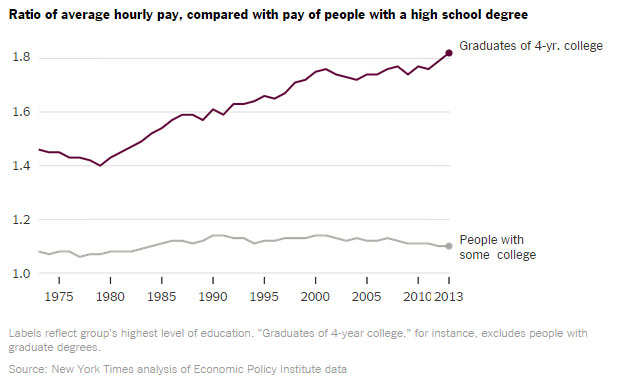
There’s many reasons why students take a break from college and take a semester off.
Some take a semester off for financial reasons and we can’t blame them costs have skyrocketed:
Over the 30 years from 1984-85 to 2014-15, average published tuition and fees at private four-year institutions rose by 146%, from $12,716 (in 2014 dollars) to $31,231. The average published price at public two-year colleges rose by 150%, from $1,337 to $3,347, and the increase for in-state students at public four-year institutions was 225%, from $2,810 to $9,139. – rates have increased quicker than inflation!
Some take it off because the courses are too much and they need a break. Others might take it off due to depression.
But is taking a semester off college the right thing to do? Whatever your reason is, we think you should stick it out because there are options to help you attend your classes when you feel like you can’t:
- Financial Aid can help you out with grants if you’re an undergrad by paying for your courses and then some. If you cannot afford to get into college debt, we suggest attending a community college for your general ed and then transfer out after 2 years. This can highly reduce costs and not risk your future career at a top tier college. Just get a great GPA. Financial Aid is easier than ever to sign up for, check out the FAFSA website for more information.
- Depression is common among first year college students and that fades as you progress. In 2011, the American College Health Association–National College Health Assessment (ACHA–NCHA—a nationwide survey of college students at 2- and 4-year institutions—found that about 30 percent of college students reported feeling “so depressed that it was difficult to function” at some time in the past year. But many feel it’s too much and don’t get it treated so they drop out.
- Most colleges offer free or low-cost mental health services to students.
- Early diagnosis and treatment of depression can relieve depression symptoms, prevent depression from returning, and help students succeed in college and after graduation.
- Cognitive-behavioral therapy (CBT), which helps people change negative styles of thinking and behavior that may contribute to depression. Check out our App that uses CBT to help motivate you.
- Taking a Break Part-Time – College courses are definitely demanding. You’re taking 4 – 6 courses a semester and each one is requiring you to spend 2 to 3 hours a day studying for it. Well just remember this, it’s like exercise. If you stop you will negatively effect your tolerance for demanding jobs. When you graduate, jobs will be ever so demanding, given that we live in a 24/7 business world now due to the internet. If anything, maybe register a a part time student, this way you don’t get too comfortable.
If you do take a semester off, don’t take another one.
A study was done in Texas, that tracked the progress of 38,000 community college students, out of the students that took a break only 72% returned, and after stepping out after a second time, the percentage of returning students completing a bachelor’s degree decreases substantially. Basically, If you leave twice you’re not going to come back.
Graduating College is very Important
Even if you don’t use your degree for its intended purposes, it will ALWAYS give you the advantage over someone who doesn’t have one. Many adults return to college years later after finding out that the job market limits their career advancements due to their education limitations.
In a recent study, data suggests that “income statistics answers those questions quite clearly: Yes, college is worth it, and it’s not even close. For all the struggles that many young college graduates face, a four-year degree has probably never been more valuable.”
The pay gap is SO HUGE that just having a degree will put you in that higher bracket.

You’re not only competing with U.S college graduates, you are not competing globally. Many occupations are moving towards remote positions, but still require a college degree.
So If you feel like taking a semester off, be-careful, because you might not return. You don’t want to lose that momentum, so stick it out and there are solutions to whatever your problems may be.





